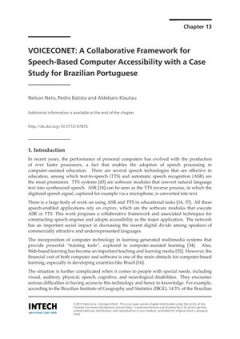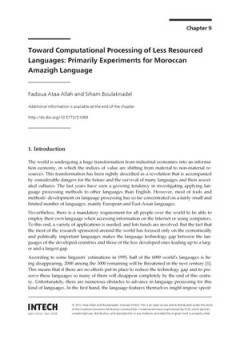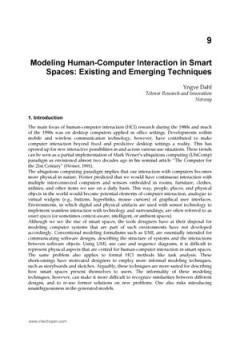Filter by

Making use :scenario-based design of human-computer interactions
"Difficult to learn and awkward to use, today's information systems often change our activities in ways that we do not need or want. The problem lies in the software development process. In this book John Carroll shows how a pervasive but underused element of design practice, the scenario, can transform information systems design.Traditional textbook approaches manage the complexity of the desi…
- Edition
- -
- ISBN/ISSN
- 9780262269926
- Collation
- 1 online resource (xiv, 368 pages) :illustrations
- Series Title
- -
- Call Number
- -

Leonardo's laptop :human needs and the new computing technologies
"Ben Shneiderman's book dramatically raises computer users' expectations of what they should get from technology. He opens their eyes to new possibilities and invites them to think freshly about future technology. He challenges developers to build products that better support human needs and that are usable at any bandwidth. Shneiderman proposes Leonardo da Vinci as an inspirational muse for th…
- Edition
- -
- ISBN/ISSN
- 9780262256988
- Collation
- 1 online resource (xi, 269 pages) :illustrations
- Series Title
- -
- Call Number
- -

The semiotic engineering of human-computer interaction
A theory of HCI that uses concepts from semiotics and computer science to focus on the communication between designers and users during interaction.In The Semiotic Engineering of Human-Computer Interaction, Clarisse Sieckenius de Souza proposes an account of HCI that draws on concepts from semiotics and computer science to investigate the relationship between user and designer. Semiotics is the…
- Edition
- -
- ISBN/ISSN
- 9780262271363
- Collation
- 1 online resource (xxi, 283 pages) :illustrations.
- Series Title
- -
- Call Number
- -

Social thinking-software practice
A collection of essays on the interrelationship of social science and software practice.Software practice--which includes software development, design, and use--needs to go beyond the traditional engineering framework. Drawing on a variety of social theory approaches, this book focuses on interdisciplinary cooperation in software practice. The topics discussed include the facilitation of collab…
- Edition
- -
- ISBN/ISSN
- 9780262271783
- Collation
- 1 online resource (xii, 481 pages) :illustrations
- Series Title
- -
- Call Number
- -

Sharing expertise :beyond knowledge management
An overview of expertise sharing, an approach to knowledge management that emphasizes the human components of knowledge work in addition to information storage and retrieval. The field of knowledge management focuses on how organizations can most effectively store, manage, retrieve, and enlarge their intellectual properties. The repository view of knowledge management emphasizes the gathering, …
- Edition
- -
- ISBN/ISSN
- 9780262266772
- Collation
- 1 online resource (xviii, 418 pages) :illustrations
- Series Title
- -
- Call Number
- -

Where the action is :the foundations of embodied interaction
"A Bradford book.""Computer science as an engineering discipline has been spectacularly successful. Yet it is also a philosophical enterprise in the way it represents the world and creates and manipulates models of reality, people, and action. In this book Paul Dourish addresses the philosophical bases of human-computer interaction. He looks at how what he calls "embodied interaction"--An appro…
- Edition
- -
- ISBN/ISSN
- 0262256053
- Collation
- 1 online resource (x, 233 pages) :illustrations.
- Series Title
- -
- Call Number
- -

Technology and Sustainable Development: The Promise and Pitfalls of Techno-So…
governance;politics;Sustainable development goals;sustainability;technological change
- Edition
- Ed. 1
- ISBN/ISSN
- -
- Collation
- -
- Series Title
- -
- Call Number
- -

Voiceconet
VOICECONET: A Collaborative Framework for Speech-Based Computer Accessibility with a Case Study for Brazilian Portuguese
- Edition
- -
- ISBN/ISSN
- 9789535108313
- Collation
- -
- Series Title
- -
- Call Number
- -

Toward Computational Processing of Less Resourced Languages
Toward Computational Processing of Less Resourced Languages: Primarily Experiments for Moroccan Amazigh Language
- Edition
- -
- ISBN/ISSN
- 9789535108528
- Collation
- -
- Series Title
- -
- Call Number
- -

Modeling Human-Computer interaction in Smart Spaces
Modeling Human-Computer Interaction in Smart Spaces: Existing and Emerging Techniques
- Edition
- -
- ISBN/ISSN
- 9789537619145
- Collation
- -
- Series Title
- -
- Call Number
- -
 Computer Science, Information & General Works
Computer Science, Information & General Works  Philosophy & Psychology
Philosophy & Psychology  Religion
Religion  Social Sciences
Social Sciences  Language
Language  Pure Science
Pure Science  Applied Sciences
Applied Sciences  Art & Recreation
Art & Recreation  Literature
Literature  History & Geography
History & Geography